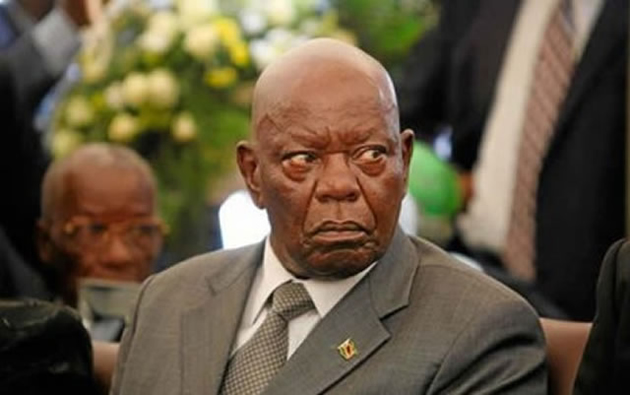Editorial Comment: The end of Didymus Mutasa

Former Zanu-PF secretary for administration, Didymus Mutasa’s spectacular fall is now complete.
On Tuesday, the Speaker of the National Assembly, Advocate Jacob Mudenda announced that Mutasa, and his relative, ex-Zanu-PF Hurungwe West MP, Temba Mliswa, were no longer MPs. This followed the duo’s expulsion from the revolutionary party for various transgressions, among them attacking the Zanu-PF congress held in December and advancingformer Vice-President, Joice Mujuru’s factional politics.
Shortly after Zanu-PF had fired them, the party’s secretary for administration, Cde Ignatius Chombo formally wrote to Adv Mudenda notifying him of the party decision. In terms of the constitution, any MP elected on the ticket of a party ceases to be a legislator as soon as he or she ceases to be member of the sponsoring party.
As highly expected, Adv Mudenda therefore declared Mutasa and Mliswa duly expelled from the National Assembly.
“It’s vital,” said Adv Mudenda, “that at this point I mention that the notification to the Speaker by the party that a member has ceased to represent its interest in the National Assembly and Parliament is all that’s required at law to create a vacancy and for the Speaker to declare the seat vacant.
“The duty of the Speaker after receipt of the notification was clearly explained in the case of Abednico Bhebhe and others versus the chairman national disciplinary committee (MDC) HCB 85/2009 by Justice Cheda that upon receipt of the notification, the Speaker of the National Assembly is constitutionally bound to declare the seat in question vacant. Honourable members, to that extent, the position of the Constitution is unambiguous regarding the declaration of a vacant parliamentary seat. Consequently, vacancies have arisen in Headlands and Hurungwe West by operation of the law.”
He went on to dismiss Mutasa’s letter to him in which the former Politburo member claimed that his sacking from Zanu-PF was unwarranted and illegal. The Speaker said he would not involve himself in internal party disputes.
The precedent that Adv Mudenda cited is compelling. It arose in August 2008 when, during the election of the Speaker, MDC MPs, among them Abednico Bhebhe voted for MDC-T candidate, Lovemore Moyo, not their own, Paul Themba Nyathi. MDC responded by firing the MPs from the party for defying its directive on how to vote in the election. The High Court confirmed that party’s decision.
For that reason, Mutasa and Mliswa’s fate was sealed well before Adv Mudenda spoke on Tuesday.
MDC-T has drawn parallels between this Zanu-PF case and the MDC-T one in which the British-backed movement sought the Speaker’s view on 18 of its former lawmakers who had defected to former secretary general, Tendai Biti’s MDC Renewal Team.
We argue there is absolutely no similarity between them.
In the MDC-T case Biti states that the MDC-T faction led by Morgan Tsvangirai cannot expel him and his 17 colleagues from Parliament because he (Biti) had actually fired Tsvangirai from the party. At the same time, Tsvangirai asserted that it was his group that had fired Biti and company and thus should be removed from Parliament. In this situation, it was impossible, the Speaker thought, to see who was in charge and who could legally cause the removal of whom from the House, thus he referred the matter to the courts.
In the Zanu-PF situation, there is no reason anyone can doubt who is in charge and who can legitimately communicate with Parliament on official matters such as the Mutasa and Mliswa one. Mutasa is just an isolated, bitter man who is refusing to come to terms with his dramatic fall.
He approached the court on Tuesday with what looks like an equally incompetent case, challenging his and former ruling party spokesman, Rugare Gumbo’s expulsion from Zanu-PF and Parliament. Furthermore, they want the December congress nullified and the compromised political structures that existed before that convention reinstated. They raise a string of purported violations of their constitutional rights as well.
We leave the High Court to decide on the application, but Mutasa and Gumbo admit in their papers that they filed it beyond the permissible period of eight weeks. Theirs came after 12 weeks, a whole four weeks late. Even before its merits are considered, the duo’s application can collapse on that technicality.
There are countless precedents of matters failing in the courts on technical grounds, for procedural imperatives are as critical as substance.
Mutasa and Gumbo, cite, as one of the reasons why they filed their papers late, that “all” local lawyers were “afraid of being associated with our court application.” Many will find this excuse ridiculous and bizarre. Tsvangirai never faced this strange challenge in the dozens of court applications he has filed against Zanu-PF since 2000. In our view, the only reason why they struggled to get lawyers is because those they approached saw the futility of their case, not that they were afraid of anything.
Zimbabwe has no shortage of lawyers who want to represent anyone against Zanu-PF, as long as those seeking their services are willing and able to pay.
There is a whole network of lawyers who got rich this way and still wants more money.










Comments